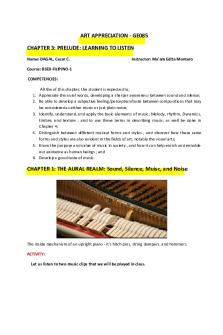Aa - HW number2 PDF

| Title | Aa - HW number2 |
|---|---|
| Course | BUSINESS FINANCE |
| Institution | The University of Texas at Arlington |
| Pages | 3 |
| File Size | 156.5 KB |
| File Type | |
| Total Downloads | 41 |
| Total Views | 153 |
Summary
HW number2...
Description
FINA 2330 - Money, Finance, and the Modern Consumer Homework Assignment 2 (30 pts. - 5 pts./question)
Provide a concise but complete answer to the following questions based on our in-class discussions and Chapters 3 to 6 of Julie Schor’s The Overspent American. Where possible, please incorporate your personal views and experience. 1. Juliet Schor suggests (see pages 60 and 61) a very simple method for calculating the annual costs of status purchases for American society. Take any status consumption good of your choosing and calculate its annual cost to society using this method. Be sure to cite your information sources for price and annual consumption rates. I suggest using the internet, marketing briefs, consumer organizations’ reports, public financial statements, business census data, or personal experience. Make sure to acknowledge any other costs you are not accounting for in your estimations. When you go to BestBuy’s website you can get this nice washer and dryer bundle for more than $3,000 including taxes close to $3,500-$4,000 ( washer & dryer ). This washer and dryer can do what they are meant to is wash and dry clothes. Most washers and dryers are supposed to last 8 to 12 years, but they can last way less than that. A year a washer & dryer can use up to $115 ( stats ). Now multiply $115 by 8 years and you get $920, and that’s bare minimum, don’t forget you also have to calculate the water used and how much that costs. If the washer and dryer break before then, in the end you’re out $5,000 plus for the washer and dryer. 2. What is the difference between needs and desires? Describe the cycle of desire portrayed by Juliet Schor in her book and give an example. Do you agree with her depiction? A need is something you can’t live without. Essential for survival. Desire is something that we want for personal reasons. The cycle of desire is “See-WantBorrow-Buy”. An example of this is you see the new and better tv at the store and you think it will make your house way better than others so you want it, then you borrow the money so you can buy the television, and then you spend the next several months paying it off. I do agree with Schor’s depiction of the desire cycle because I have seen people/friends prove Schor’s depiction.
3. According to Juliet Schor, why is Television such a dangerous influence on consumption in America? What role do luxury good advertisements play in this, are they the main problem? What about the TV shows themselves? Do you agree with
Schor’s point of view? Can you think of an example of how your favorite TV show may induce you to overspend (be specific)? Television is a dangerous influence because research shows the more television a person watches then the more that person will spend. Television raises the bar on what the consumer thinks is a normal lifestyle. The luxury life of people or commercials change the view of people. TV shows have been proved to impact the perception of viewers, especially reality. I agree with Schor’s point of view because most people spend their time television or other media videos, and that the media impacts what people want to spend their money on. An example of how my favorite TV show can impact my spending could be, seeing my favorite character using a certain item or having a certain thing and me wanting to be like them, and spend money doing so. 4. What does it mean to have an escalation mentality? What are some of the most quoted practical reasons justifying this phenomenon (give at least three)? In your opinion, are they valid? Can you think of any ways to break away from these rationales? An escalation mentality is a mentality that you need to keep spending money to keep up with society. Reasons people use to justify this are, “Demands of our hectic work lives push us to consume”, “Technology also pushes us into an escalating consumption spree. We need to keep up to be functional” and “Spending is essential in our socialization process. It’s unavoidable”. In my opinion, I think these reasons are valid because I usually end up doing them. A way I break from these rationales is by consistently telling myself I do not need the item/etc. For example, I don’t really need the new iPhone every year as long as my current iPhone is still useable, but I like staying up to date on iPhones. 5. Describe three modern counter-consumerism movements (discussed in the text or from alternative sources). Which of these movements would you be most likely to join? What do you think would be the biggest challenges you will encounter when doing so? How would you face these challenges? Three modern counter-consumerism movements are Screen-Free week, BlackSpot Sneakers, and Buy Nothing Day. Screen-Free week was from May 1st to the 7th in 2017 and the idea is to turn off all of the screens and enjoy your life. This reduced the amount of advertising you see which would reduce the amount of money you spend on consumer goods. Black-Spot Sneakers aims to eliminate the sweatshop labor and provide eco-friendly shoes to consumers. Buy Nothing Day is the day after Thanksgiving which is also known as the notorious Black Friday. On Black Friday stores have crazy deals on items that are considered good. The idea behind Buy Nothing Day is to not give into those deals and don’t spend your money on those items. I would most likely join Buy Nothing Day because I know I could control myself on Black Friday. My biggest challenges would be to not spend money, but I love spending money. I would face these challenges by talking myself out of the deals and convince myself that I don’t need them.
6. Juliet Schor presents in her book nine ways in which people can get off the consumer escalator. Describe the two that you believe to be the most effective of the set. In your opinion, what makes them so effective? Which one do you think is less likely to work for you or for most people? Describe it and state what makes it so ineffective? The two principles I think to be the most effective are controlling desires and how much you let symbolism mean. I think desires is so effective because of the want of certain items, and the want to spend money. The reason I believe symbolism plays a big part is because of what we perceive an item to mean. If we think that item is valuable then it is, like money for example, (fabric/paper) not much in value but we made it something that has value. The one that is less likely to work for most people is making exclusivity uncool. A lot of people are into buying the brand names like Nike and Adidas, and those people don’t like buying the offbrands in fear of not fitting into society. This is what would make it hard for people to adopt into their lifestyle....
Similar Free PDFs

Aa - HW number2
- 3 Pages

RPA AA - RPA AA
- 7 Pages

AA - metabolismo de aa
- 4 Pages

Bilewicz 2006 2 - aa aa
- 12 Pages

Aa - excel
- 10 Pages

AA Syllabus
- 18 Pages

AA Distributors
- 2 Pages

AA Paper - Required essay
- 6 Pages

Mona Lisa AA
- 2 Pages

AA LP Ventilator
- 1 Pages

AA Script for presentation
- 1 Pages

Guia AA 1 Excel
- 33 Pages

HW 12 - HW 12
- 3 Pages

Hw 1 - quest hw
- 9 Pages

Chapter 3 AA - Goodluck
- 13 Pages

proteinas,aa y vitaminas
- 26 Pages
Popular Institutions
- Tinajero National High School - Annex
- Politeknik Caltex Riau
- Yokohama City University
- SGT University
- University of Al-Qadisiyah
- Divine Word College of Vigan
- Techniek College Rotterdam
- Universidade de Santiago
- Universiti Teknologi MARA Cawangan Johor Kampus Pasir Gudang
- Poltekkes Kemenkes Yogyakarta
- Baguio City National High School
- Colegio san marcos
- preparatoria uno
- Centro de Bachillerato Tecnológico Industrial y de Servicios No. 107
- Dalian Maritime University
- Quang Trung Secondary School
- Colegio Tecnológico en Informática
- Corporación Regional de Educación Superior
- Grupo CEDVA
- Dar Al Uloom University
- Centro de Estudios Preuniversitarios de la Universidad Nacional de Ingeniería
- 上智大学
- Aakash International School, Nuna Majara
- San Felipe Neri Catholic School
- Kang Chiao International School - New Taipei City
- Misamis Occidental National High School
- Institución Educativa Escuela Normal Juan Ladrilleros
- Kolehiyo ng Pantukan
- Batanes State College
- Instituto Continental
- Sekolah Menengah Kejuruan Kesehatan Kaltara (Tarakan)
- Colegio de La Inmaculada Concepcion - Cebu